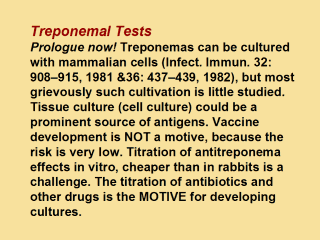| front |1 |2 |3 |4 |5 |6 |7 |8 |9 |10 |11 |12 |13 |14 |15 |16 |17 |18 |19 |20 |21 |22 |23 |24 |25 |26 |27 |review |
 |
Fluorescent
Treponemal Antibody-Absorption FTA-ABS, Microhemagglutination
Treponema pallidum MHA-TP and: T. pallidum particle
agglutination TP-PA tests are wellknown. In Europe, screening is
based mainly on treponemal antigen tests such as the microhemagglutination
assay for T. pallidum antibodies (MHA-TP), whereas in the US, the
Rapid Plasma Cardiolipin antigen test (RPR) or the Venereal Disease Research Laboratory test (VDRL) is recommended as a screening test. Cardiolipin tests such as the RPR or VDRL, although technically simple and cheap, are labor-intensive, may occasionally give false-negative reactions due to the prozone phenomenon, and are insensitive with samples from patients with early or late-stage infections. T. pallidum-specific tests such as the MHA-TP also lack sensitivity in the early stage of the disease; and they offer the highest sensitivity for the late stages of the disease. These 2 common treponemal tests measure antibody specific for T. pallidum. They are specific and sensitive. Treponemal tests are not currently used for general screening because they are expensive and time consuming to perform. Their use is limited to confirmation of positive reagin tests and in the diagnosis of late syphilis when reagin tests may be nonreactive. Tests based on antigens produced with recombinant DNA techniques from single genes like TmpA; the 4D antigen, a ring-forming decamer on the outer membrane or a combination of different recombinant proteins have become available. Most of the new tests have been evaluated in comparison with a standard test. |